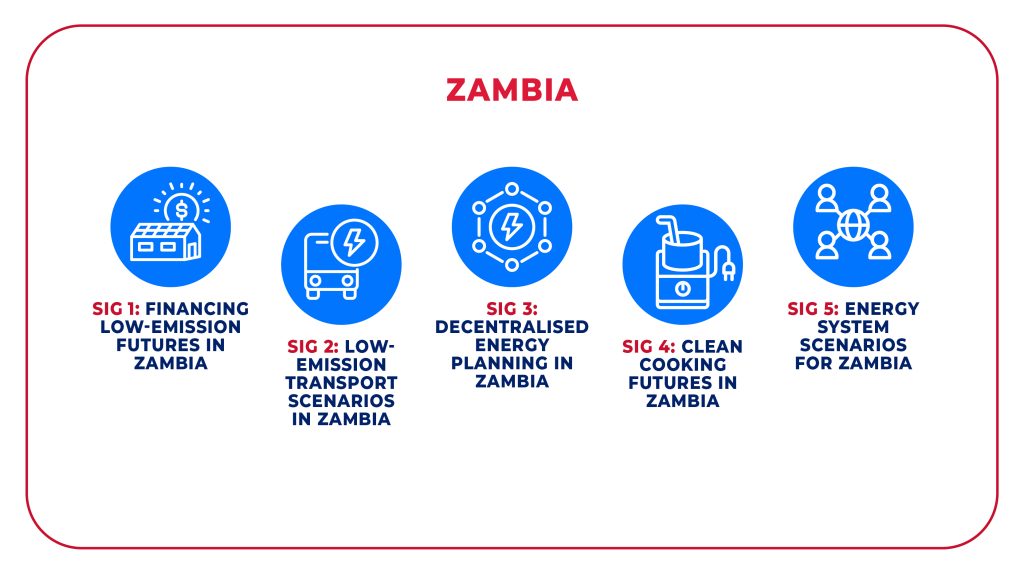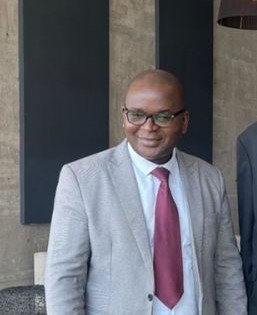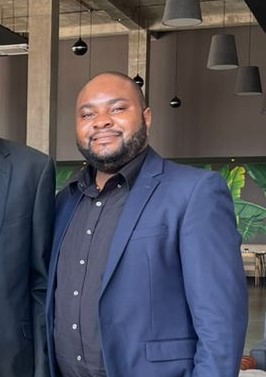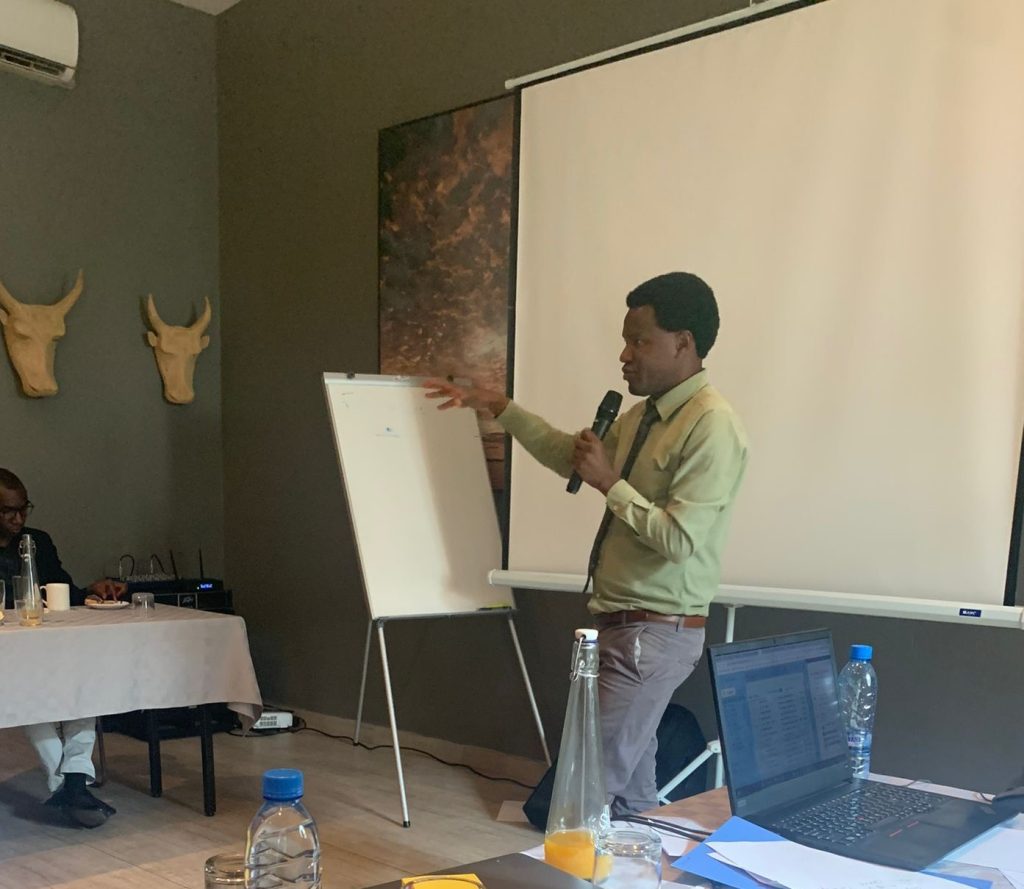CCG in Zambia
Overview
The Zambia CCG Network began in October 2022 as CCG’s third partner country network, with the Department of Geography and Environmental Studies of the University of Zambia (UNZA) leading as the institutional partner in the county. Through the Zambia country network, the CCG programme collaborates with key policymakers in Zambia, along with leading domestic researchers from Zambian academic institutions.
In Zambia, we aim to empower the Government of the Republic of Zambia to devise and implement inclusive, low-emission, resilient economic policy. To reach this goal, we conduct a range of research and collaboration outputs, including co-creation workshops and capacity building events. To see more details about our activities, read more below.
The Zambia CCG Network Special interest Groups
The Zambia CCG Network is made up of Special Interest Groups (SIGs), which are populated by a group of country and CCG experts (academia, government, development banks, among others) that have a defined interest and/or expertise on a theme relevant to CCG research, and together, each SIG works collaboratively. The aim of a SIG is to catalyse a collaborative community of practice and identify areas of policy or innovation that could be bolstered by CCG resources and/or capacity.
The Zambia CCG Network currently contains five SIGs:

SIG 1: Financing Low-Emission Futures in Zambia
To bolster both public and private investment into green policy implementation, the Government of the Republic of Zambia (GRZ) is strengthening its fiscal policy and public finance management by enhancing domestic resource mobilisation, increasing efficiency of public expenditure, avoiding the accumulation of arrears, and improving fiscal transparency. This SIG seeks to work with Zambian stakeholders to identify and leverage economic opportunities associated with Zambia’s green growth agenda.
SIG 2: Low-Emission Transport Scenarios
The Zambian government is actively pursuing a plan to decarbonize the transport sector, recognising the environmental and economic benefits of transitioning to cleaner and more sustainable transportation options. To achieve this, the government is promoting the adoption of electric vehicles (EVs), improving public transportation infrastructure, and investment in renewable energy sources to power EVs. Additionally, measures such as fuel efficiency standards and the promotion of non-motorized transportation modes like cycling and walking are being encouraged. This SIG will explore inclusive low-emission transport scenarios for Zambia.
SIG 3: Energy System Scenarios for Zambia
Zambia currently possesses 2,800 MW of installed electricity generation capacity, with 85% of it being hydro-based. However, only 43% of the national population has access to electricity, with a significant urban-rural disparity. The GRZ aims to achieve universal electricity access by 2030, recognizing energy as a crucial driver of social and economic development. Diversifying Zambia’s energy mix has become a key priority, with cases of climate change-induced disruptions to rainfall patterns increasingly leading to extensive load shedding during the dry season across the country. Consequently, the GRZ also plans to place a strong focus on incorporating increased solar, hydro, and thermal power sources through the participation of both state-owned and private sector entities. This SIG aims to support these efforts by strengthening energy system modelling capacity within policy-making institutions and increasing the evidence base for various energy transition scenarios.
SIG 4: Decentralised Energy Planning
The newly approved Decentralisation Implementation Plan marks a significant step forward by extending decentralisation to the district level within Zambia. While individual Sector Devolution Plans have already begun devolving sectors like health and education, an energy-specific plan is currently in development. These initiatives not only contribute to environmental sustainability but also foster social inclusion. In this context, decentralisation of the energy system brings forth numerous advantages. It allows for tailored, locally responsive energy solutions that address the unique needs of various communities, which is crucial for social inclusion. This SIG engages a variety of stakeholder groups to consider the potential frameworks for inclusive decentralised energy planning in Zambia.
You can read about the recent workshop in April 2024 here.
SIG 5: Clean Cooking
Charcoal has been a major source of cooking fuel in Zambia, leading to extensive deforestation as trees are cut down for charcoal production. To mitigate this environmental impact, clean cooking policies in Zambia can encourage the use of more sustainable and efficient cooking technologies, such as improved cookstoves and alternative fuels like liquefied petroleum gas (LPG) and biogas. By promoting the adoption of these cleaner alternatives, the government aims to decrease the demand for charcoal and, in turn, reduce the pressure on Zambia’s forests, ultimately helping to curb emissions from deforestation. To this end, the GRZ is currently developing its clean cooking strategy and action plan (CCSAP) in collaboration with USAID. This SIG’s activities seek to increase the evidence base in support the implementation of these policies.
The Zambia CCG Network Team
Zambia-based:

Dr Kabwe Mubanga
(kabwe.mubanga@live.com)
Kabwe Mubanga holds a PhD in Environment and Society from the University of Pretoria in South Africa. He is a lecturer at the University of Zambia (UNZA) and serves as a climate change specialist under the National Technical Committee for Climate Change and a climate change negotiator for Zambia. He sits on the Adaptation and Means of Implementation and Disaster Management sub-committees for Zambia. Kabwe is also a Director at the Centre for Climate Change Policy and Integrated Research (CCCPiR).

Mr Clement Sichimwa
(csichimwa@gmail.com)
Clement Sichimwa is a lecturer and researcher, with an MSc in Environmental Ecology and pursuing a PhD in Tourism Management. His research interests include Tourism, Gender, and Climate Change. Nearing completion of his PhD at the University of Pretoria, South Africa, Clement is excited to be supporting research efforts with the Climate Compatible Growth programme.
UK-based (Centre for Global Equality and University of Cambridge)
Dr Beth Tennyson elizabeth.tennyson@centreforglobalequality.org
Dr Kirsty Mackinlay kirsty.mackinlay@centreforglobalequality.org
Dr Lara Allen [profile]
Research
The research for Zambia can be found on the CCG Research Index here.
Network Engagement
The most recent engagement is the 10 April Workshop on Decentralised Energy Planning which you can read about here.
Right at the start, to kick-off the Zambia CCG Network, an Inception workshop was held in March 2022, which brought together key researchers and decision makers to discuss the key low-emission growth priorities of Zambia. The following year, the Network held its Annual Workshop, convening SIG members together to reflect on the progress made over the first year.

Ministry of Energy, Zambia
In March 2023 we held a Workshop on Energy Sector Devolution, with the University of Zambia and our SIG. This is part of our Southern Partner Fund work with Mashekwa Maboshe, PhD. The session opened with remarks from Mr Agnelli Kafuwe from the Ministry of Energy, Zambia. Several breakout groups mapped the steps, mechanisms, challenges, and opportunities in energy decentralisation. We were delighted to be joined by Zambia Electricity Supply Corporation (ZESCO) Akabondo Kabechani Bwalya Funga Desmond Banda from the Ministry of Finance, Chilombo Chila from CIGZambia, Eric Musama Alexander Chileshe from UN-Habitat (United Nations Human Settlements Programme) and many others contributing their expertise.
In his closing remarks, Mr Agnelli Kafuwe said that the event was an eye-opener for him, causing him to re-evaluate how things are done.
In October 2023 we held a Workshop on Decentralised Energy Planning In Zambia, with the University of Zambia.
